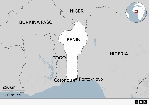Nigeria investigates nearly 800 suspects arrested in massive cybercrime raid
 Nigeria's anti-corruption agency, the Economic and Financial Crimes Commission, says it is investigating nearly 800 suspects arrested for alleged internet fraud during a massive raid in Lagos, Dec. 10, 2024
Nigeria's anti-corruption agency, the Economic and Financial Crimes Commission, says it is investigating nearly 800 suspects arrested for alleged internet fraud during a massive raid in Lagos, Dec. 10, 2024
Nigeria's anti-corruption agency, the Economic and Financial Crimes Commission, says it is investigating nearly 800 suspects arrested for alleged internet fraud during a massive raid last week in Lagos.
The Economic and Financial Crimes Commission says this is the greatest number of arrests it has ever made during a single raid.
EFCC spokesman Wilson Uwujaren told VOA on Tuesday that the raid followed months of intelligence work and surveillance.
The 792 suspects, including 193 foreigners, mostly Chinese, were nabbed December 10 in a seven-story building believed to be a “hustle kingdom” - a place where people are trained to carry out cybercrimes.
Uwujaren said the foreigners were recruiting Nigerians there and training them on romance and investment scams targeting victims from North America and Europe.
"For us it's a testament to the fact that we're unrelenting in our efforts to ensure that financial crimes wherever they exist in the country are checked. And then this current operation for us is an eye opener because of the large number of foreigners involved which is an indication that the perception of Nigerians as fraudulent people may not be true. We have a number of foreigners now coming to Nigeria to perpetrate frauds that are ascribed to Nigerians," he said.
The EFCC recovered hundreds of computers, phones and vehicles during the raid.
The commission says it is collaborating with international partners to determine whether the suspects are linked to a broader network of internet fraud cells.
Cybercrime is a growing problem in Nigeria. In April, a report by a coalition of researchers from the Universities of Oxford and New South Wales ranked Nigeria fifth in the world for cybercrime activities, behind only Russia, Ukraine, China, and the United States.
Lack of economic opportunities, inadequate cyber security awareness and poor law enforcement are the reasons the trend is rising in Nigeria, according to cybersecurity analyst Abayomi Adeyanju.
"There are very good IT [information technology] people with skills, and then they graduate from universities, study, get certifications and there are no jobs for them, and they would have to [eat]. I am not one to encourage crime but these people - their skills can be used," he said.
Adeyanju said beyond prosecuting offenders, Nigeria must create more opportunities in the tech sector to significantly curb cybercrimes.
"If we can fix employment issues, these people are not being gainfully used. The skill is just there and so, if they have nothing to eat, the instinct of humans first is survival, so I think the first thing that should be done is that the economy should be fixed and then more employment opportunities be created," he said.
The EFCC said the suspects will be brought into court to face charges in the coming days.
Source: voanews.com/Timothy Obiezu
Trending World

Benin coup attempt foiled by loyalist troops, interior minister says
14:21
Hunt under way for Benin coup plotters as two hostages reportedly freed
17:40
One hundred abducted schoolchildren released in Nigeria
16:51
Tinubu commends Nigerian military for foiling coup attempt in Benin
07:05
Nobel officials unsure when Peace Prize winner will arrive for ceremony
00:18
A coup too far: Why Benin's rebel soldiers failed where others in the region succeeded
15:51
Burkina Faso accuses Nigerian Air Force of violating its airspace
15:48
Sudan militia chief sentenced to 20 years for war crimes during Darfur conflict
15:46
Tanzania crackdown on planned protest leaves streets deserted
15:44
Ukraine prepares new peace plan as Zelensky rules out giving up land
14:40



